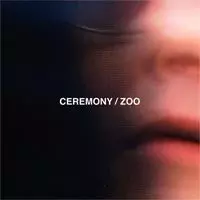Although 2010's Rohnert Park gave hints of Ceremony's impending metamorphosis, Zoo exhibits the group emerging from their cocoon as an entirely new entity, albeit one sharing an internal structure with their former selves.
Immediately upon the first crack of the album's first track, "Hysteria," it becomes apparent how much the band has progressed. Anthony Anzaldo's metallic guitar hangs in the air, cutting broad strokes across the song. While the massive sound still retains early Cro-Mags as a reference point, the clean, purposefulness of the notes suggest the precious and cold distance of early post-punk innovators Wire, Crisis and Gang of Four.
Whereas the band used to throttle forward at a blinding pace only to snap to a lumbering breakdown, they've cleaned their instrumentation. Instead of creating sheets of white noise in order to make a huge racket, each note seems to have its place. Indeed, on slower and steadily paced tracks "Hotel" and "Video" the band seems to savor each beat, letting the fill color of the music grow and finally fade away before moving on to the next flavor.
Such a tactic shows one of Ceremony's greatest strengths. Where hardcore bands seem to merge together into a indecipherable mass of dudes in black, Ceremony has opted to give each tiny element a purpose, and remove any excess material. Where the band used to be red hot explosive anger, now they are distanced, cold and calculating.
Even more interesting is how the new approach has evolved the band, as well as highlighted their core identity. Ross Farer's lyrics and vocal delivery have evolved to a more detached perspective. On older tracks such as "Back in '84," "Open Head" and "This is My War," Farrar seemed to be screaming from the pit of his stomach about topics that affect him directly, or at least the direct interactions between two people. But, on Zoo Farrar seems to address topics from a universal perspective. "Hysteria"and "Community Service" talk about the human race as a whole, contemplating the human condition more than a particular person's troubles. The presentation of these concepts is highlighted by Farrar's new vocal style. In place of his throat shredding screaming, he now calls out to the winds, perhaps inhabiting the role of a prophet or philosopher--on both accounts able to make broad proclamations about things bigger than those directly at hand.
But, as the band stretches outward, it becomes clear that their core has remained the same. Not that Ceremony has ever been a band to wear their influences on their sleeves, but in their earlier works, they seemed to be drawing from the same well as the hardcore legends of yesteryear. While the music here is perhaps more reserved, the band retains their unique talent for writing snappy, simple hooks that bewilderingly have never been recorded before, despite their spark, much in the way the earliest punk rockers out rocked the original rockers.
The evolution has come at somewhat of a cost. While Ceremony has always been a unique band, and now they are even more singular. But in becoming larger, both in sound and concept, the band doesn't sound quite as fierce--the edge of desperation which made their work so visceral and direct has been replaced by a sound that more begs to be dissected and savored instead of lived and devoured. That's not to say that the change was a poor decision. To, the contrary, the new sound exhibits that the band wisely has stepped outside the arbitrary confines of hardcore punk, but in doing so, some of the bonuses of those confines have dissipated.
In stretching their wings, it seems that Ceremony has recorded their most honest record to date. Between its ghostly riffs, moaned lyrics, and throbbing pulse, Zoo is a Ceremony changed, but by so willfully accepting, and even pursuing this change, the band has released their most "punk" record to date.
